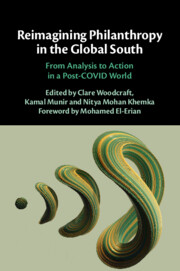Over the past few years, a range of adverse external factors has converged, transforming the basic notion of philanthropy from a ‘nice to have’ to a ‘must-have’. This makes it important to improve the impact of philanthropy while simultaneously expanding the size of philanthropic investment and its scope.
The paradigm shift in philanthropy that is required to maximise its potential is unlikely to occur without a fundamental and durable change in the underlying mobilisation and deployment mechanisms: moving away from inequitable power dynamics fraught with tensions and blame games to much more cooperative, enabling, and trust-based set-ups. Such a change would open up opportunities for systemic transformation and the full empowerment of both recipients and donors.
The need for such a change is obvious at a macro level. The world has become unusually uncertain and susceptible to frequent and violent socio-economic, political, and geopolitical shocks. From the COVID pandemic and the escalating cost of living crisis to China–United States tensions and Russia’s invasion of Ukraine, the basic drivers of welfare enhancement have been weakened. This urgency is exacerbated by worsening inequality, not just in terms of income and wealth, but also in terms of opportunity. The vulnerable segments of our global society are particularly hard hit.
The need is also obvious at a micro, community level. The frictions inherent in the power imbalance between donors and recipients is hindering the effectiveness of philanthropic capital and stymieing the sense of joint accomplishment that is so essential for sustaining cooperative and growing relationships. Collaboration is too often undermined by mutual suspicion, misunderstandings, and incentive misalignments. The desire of donors to give and the needs of recipients become harder to match.
However, amidst these concerning developments, two silver linings emerge.
Firstly, there is a growing recognition among more privileged segments of society of the importance of supporting the less privileged. This recognition is driven not only by moral considerations but also by self-interest. There is an understanding that one cannot thrive as an isolated entity in a challenged neighbourhood.
Secondly, this recognition has been accompanied by a broader acknowledgement of the need to enhance the effectiveness of philanthropy through collaborative and incentive-aligned dynamics that include both donors and recipients. Beyond mere financial considerations, donor generosity and flexibility must be met with stewardship and accountability from recipients. Both parties must work together with aligned and shared goals that can foster multi-actor partnerships. This approach leads to a more sustainable and comprehensive process of creating long-term, sustainable system change.
This book plays an important role in advancing this agenda. By focussing on three challenges – building networks, effective partnerships, and institutional resilience – it aims to stimulate discussions and actions centred around strategic and catalytic philanthropy. It comprises insightful essays written by practitioners that address risks and opportunities in an action-oriented manner. From the experiences of individual foundations to those of philanthropic networks, it offers engaging discussions not only on pursuing promising practices and approaches but also on avoiding potential pitfalls and diversions.
All three themes emphasise the importance of not only minimising the risk of falling but also swiftly recovering from the falls in our increasingly unpredictable world. This highlights the significance of a robust social-sector foundation, particularly in health and education, and underscores the need for collective responsibility rather than individual action.
Regrettably, there is little indication that our world will become more accommodating in the coming years. Also, there is little to suggest that, without external support, the most vulnerable segments of society will be able to reduce the multiple debilitating risks they face.
There are neither quick nor readily available solutions to the climate crisis or to the economic pressures stemming from inadequate growth, burdensome indebtedness, onerous inflation, and excessive inequality. We must make a concerted effort to act where there are windows for feasible and desirable improvements.
The insights provided in this book contribute significantly to this endeavour. They offer actionable guidance on how to enhance private philanthropy in a mutually beneficial and sustainable manner.

